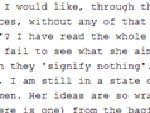
Ten reasons why the women of New Zealand should vote (1888)
This is the text of a leaflet published by the Women's Christian Temperance Union in May 1888, which was sent to every member of the House of Representatives.
1. Because a democratic government like that of New Zealand already admits the great principle that every adult person, not convicted of crime, nor suspected of lunacy, has an inherent right to a voice in the construction of laws which all must obey.
2. Because it has not yet been proved that the intelligence of women is only equal to that of children, nor that their social status is on a par with that of lunatics or convicts.
3. Because women are affected by the prosperity of the Colony, are concerned in the preservation of its liberty and free institutions, and suffer equally with men from all national errors and mistakes.
4. Because women are less accessible than men to most of the debasing influences now brought to bear upon elections, and by doubling the number of electors to be dealt with, women would make bribery and corruption less effective, as well as more difficult.
5. Because in the quietude of home women are less liable than men to be swayed by mere party feeling, and are inclined to attach great value to uprightness and rectitude of life in a candidate.
6. Because the presence of women at the polling-booth would have a refining and purifying effect.
7. Because the votes of women would add weight and power to the more settled and responsible communities.
8. Because women are endowed with a more constant solicitude for the welfare of the rising generations, thus giving them a more far-reaching concern for something beyond the present moment.
9. Because the admitted physical weakness of women disposes them to exercise more habitual caution, and to feel a deeper interest in the constant preservation of peace, law, and order, and especially in the supremacy of right over might.
10. Because women naturally view each question from a somewhat different standpoint to men, so that whilst their interests, aims, and objects would be very generally the same, they would often see what men had overlooked, and thus add a new security against any partial or one-sided legislation.

Community contributions